Dear Mr. President,
In your April 20 meeting with Italian Prime Minister Paolo Gentiloni, you discussed the extraordinary emergency facing not only Italy, but all of Europe—namely migratory flows on the scale of those seen during World War II. While much of the challenge stems directly from the Syrian civil war, the Maghreb—and Libya above all—is a key contributing factor. Libya is amid a very delicate moment: Its government is fragile, struggling for survival in the face of a growing number of jihadi threats that move through porous borders. The crisis runs so deep that some Libyans express nostalgia for the stability—however superficial, oppressive, and fragile—of Moammar Gadhafi’s rule. The fact is that Libya is not nearly as far from U.S. interests as it might seem.
Yet during your admittedly cordial meeting with Gentiloni, you said: “I do not see a [U.S.] role in Libya. I think the United States has right now enough roles. We’re in a role everywhere. So I do not see that.” You added: “I do see a role in getting rid of ISIS”; while that’s a welcome step, it’s too small. Salafi terrorism does not only manifest itself through ISIS in Africa, but also through al-Qaida, Ansar Sharia, and a host of other less famous but equally dangerous cells.
North Africa faces two main terrorism-related challenges at the moment: the return of foreign fighters from the Syrian-Iraqi war theater and, above all, state weakness and dysfunction that provides fertile soil for extremism to grow. Particularly since the Arab Spring and the instability that followed, many of these nations have become more fragile, unable to respond adequately to the needs of their own citizens and crushed by increasing economic pressure (compounded, particularly in Libya’s case, by low oil prices).
The hopes that emerged across the region six years ago now face an endemic plague of corruption and lack of leadership. Vast areas of uncontrolled territory leave local communities unable to defend themselves, and state borders are extraordinarily porous. It is no surprise that these states have become places of choice for Salafi terrorism.
In early March, for example, the al-Qaida factions of Ansar al-Dine, al-Murabitoun, and Macina Brigade—which until recently fought each other—formed a new cell called Islam and Muslim’s Victory Group. It named as its leader Abdelmalik Droukdel, who until then was the leader of al-Qaida in the Islamic Maghreb (AQIM). Although international efforts have reduced al-Qaida’s presence in Afghanistan, Iraq, Pakistan, and Yemen, it has grown in the Sahara and in the Sahel. Moreover, a group called Islamic State in the Grand Sahara—officially recognized by ISIS leader Abu Bakr al-Baghdadi—has emerged, confirming the so-called Islamic State’s expansion into Tunisia, Libya, and the Egyptian Sinai.
It’s clear, then, that the soil in North Africa is as fertile as ever for extremists. They benefit enormously from an extraordinarily favorable context in which state authority is all but absent. It is especially true in Libya, but porous borders spread the contagion to Tunisia and Algeria as well. Border security projects implemented during the Italian occupation of Libya in the 1930s and during the Algerian War in the 1950s—involving constantly patrolled, highly electrified barbed wire fences along 500 kilometers of the Algeria-Tunisia border (flanked by a minefield stretching for 45 meters on both sides)—have fallen into total disrepair. Across North Africa, borders are only as real as lines on a map.
That, Mr. President, is the current situation in North Africa. And the chaos has undeniable ramifications for Europe, as it crosses the Mediterranean Sea. A turbulent North Africa means a more fragile Europe and a weaker ally. You say that U.S. involvement in Libya is a burden of the Obama presidency that you do not want to inherit. And I understand. However, as a historian, I have to remind you that great is the statesman who can solve what, for those who had preceded him, had been impossible. As an analyst, it is my duty to point out that the vacuum left by the Unites States and its allies in Libya could be conquered by the Russians, who are gaining new support bases in the Mediterranean and Africa—not only at military level but also, and above all, at the economic one.
This does not mean, of course, that the United States should take upon its shoulders the preponderance of the effort in Libya, as it has done on other international chessboards in the past. But the U.S. contribution, especially in diplomatic terms, is crucial. Washington must tap a competent special envoy for Libya, and offer support in every possible way for an agreement between the House of Representatives in Tobruk and the Government of National Accord in Tripoli. I firmly believe in the idea of federalism for Libya—which, crucially, does not mean the creation of three new states—but the country, at the moment, is too fragmented for that to be implemented. Libyans need some base on which they can work to build a new country.
What might at first sight seem like a theater of little relevance, not worthy of America’s investment, could turn out to be of great strategic importance. If Washington is to adopt an appropriate strategy in response, it must recognize that—and act on it—soon. Because disengaging, Mr. President, does not mean to be safe.
The Brookings Institution is committed to quality, independence, and impact.
We are supported by a diverse array of funders. In line with our values and policies, each Brookings publication represents the sole views of its author(s).


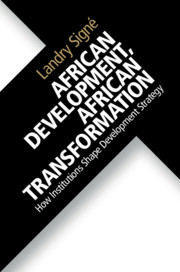
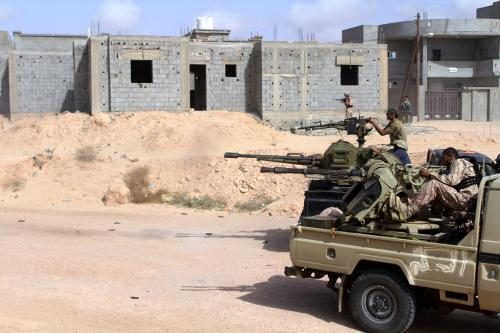
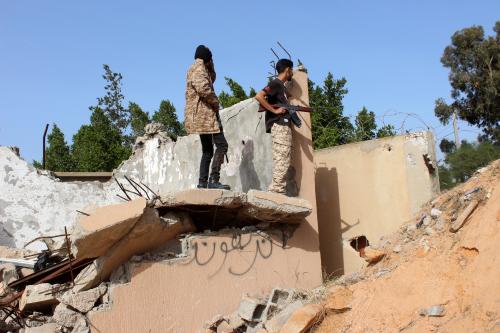
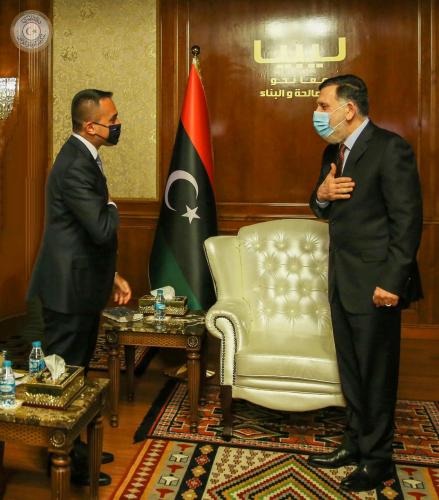

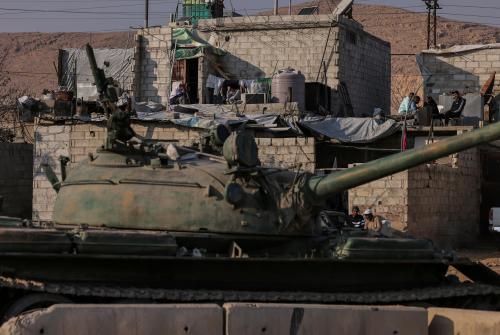
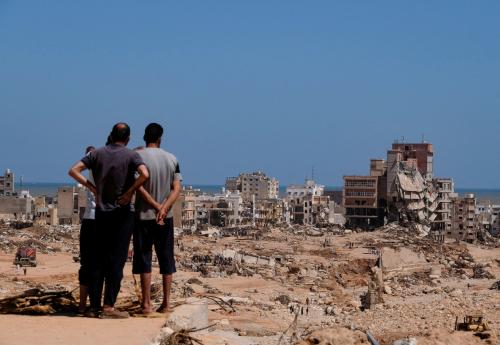

Commentary
President Trump, don’t ignore Libya
May 1, 2017